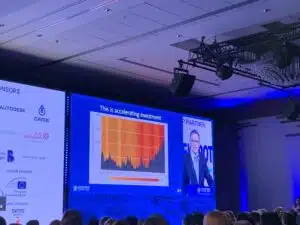Insights from GWI: Why water reuse, AI, and urgent investment are key to climate resilience—and why every boardroom must take notice.
From Every Drop, Many Drops: Reflections from GWI on Reuse, AI, and Urgency in Water Investment
By Karyn Georges, Managing Director, Isle Utilities
At this year’s Global Water Intelligence (GWI) Summit, water reuse, artificial intelligence, and investment emerged as three defining threads woven through nearly every conversation. Days later, one idea continues to reverberate: the need to shift our narrative—and practice—away from linear water consumption to circular water stewardship.
Reimagining Water: From One Drop to Many
The notion of “getting value out of every drop” is not just a slogan—it’s an urgent call to rethink how we treat, reuse, and respect water throughout its lifecycle. Globally, we must accelerate a transition to systems that reuse water again and again. This requires a mindset shift, one that sees water not as an expendable input, but a finite, regenerable resource.
Singapore’s “Four National Taps” approach was a particularly powerful case study. Through local catchments, imported water, desalination, and NEWater (recycled water), Singapore has built a climate-resilient portfolio that embeds water reuse and demand management into its national DNA. Since 2002, recycled water has been used for industrial applications—and increasingly for potable use. Importantly, the public is on board. Education and pricing play a key role in cultivating water consciousness.
What Boards Must Understand: Water Is a Material Risk
If we could tell every boardroom one thing, it’s this: Water must be central to every business decision. Climate risk is water risk. Yet too often, water is still seen as someone else’s problem.
The climate crisis is accelerating—faster and harder than experts predicted 20 years ago, as Professor Nicholas Stern reflected during the summit. A striking graph presented at GWI, commissioned by the organisers, underscored this visually: from 2003 to 2025, both temperature anomalies and the intensity of droughts and floods have clearly increased. The message is unambiguous: we must accelerate our investments in climate adaptation now—if it isn’t already too late.
And yet, a World Bank presentation revealed that only 2% of global water investment currently comes from the private sector. To meet the mounting challenges ahead, that has to change.

AI in Water: Hype or Help
Isle’s session focused on the intersection of AI and water utility challenges. We curated 30 AI solutions—ranging from efficiency-boosting tools to systems that make sense of the complex web of data utilities hold. Post-session discussions centered on where AI has the most immediate impact—such as workforce augmentation for aging infrastructure—and where it may not yet deliver value.
There’s great promise in AI, but its value depends on timing, context, and real-world applicability. For example, AI won’t turn a 1960s manual valve, but it can forecast when that valve will fail—and guide workforce deployment more efficiently.
The good news? We’re seeing AI woven into technologies across the board. This isn’t a siloed innovation; it’s becoming a foundational layer, making solutions smarter, faster, and more accessible. And with the open nature of AI tools, innovation could become more democratized—spreading not just technology, but equity.
What We Didn’t Get to Share
With over 100 AI-enabled solutions reviewed during our research, there was so much more we wished we could cover. From systems that predict leaks before they happen, to tools that integrate environmental, performance, and financial data into a single platform—AI is evolving fast.
But we’re also clear-eyed: AI is not a silver bullet. It’s a powerful tool that must be applied responsibly, in ways that do not drive up water demand (as data centers themselves are energy and water-intensive).
Final Thought: This is Everyone’s Problem
Water reuse, AI, and climate investment may seem like distinct themes—but they are deeply connected. They point to one urgent truth: we need to rethink how we value water. Every drop reused is an investment in resilience. Every AI deployment is a chance to do more with less. Every boardroom decision that puts water on the agenda is a step toward a livable future.
Let’s make water everyone’s business—before the climate makes it impossible not to.

